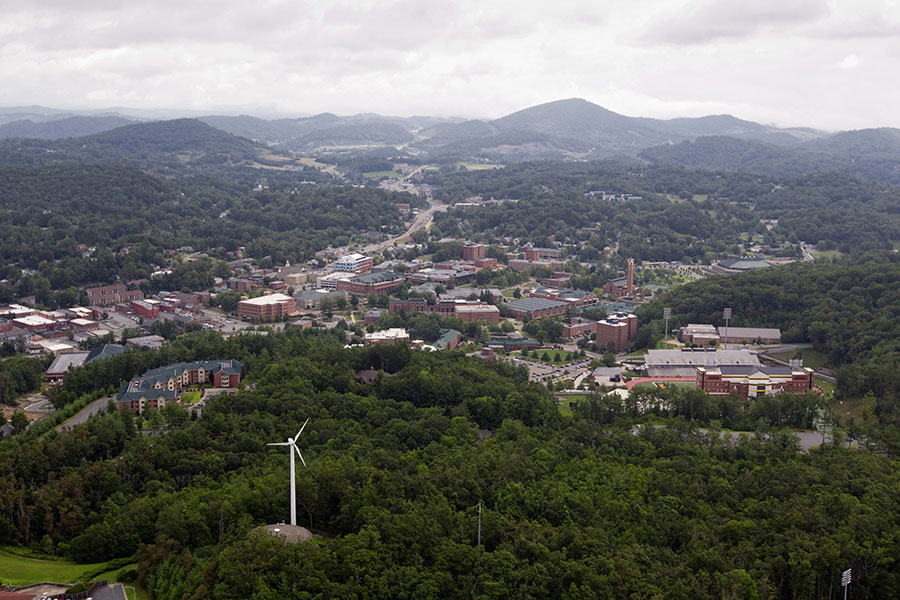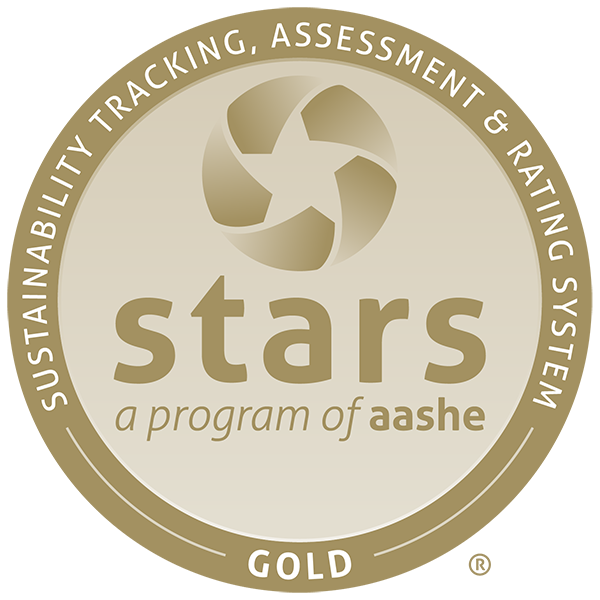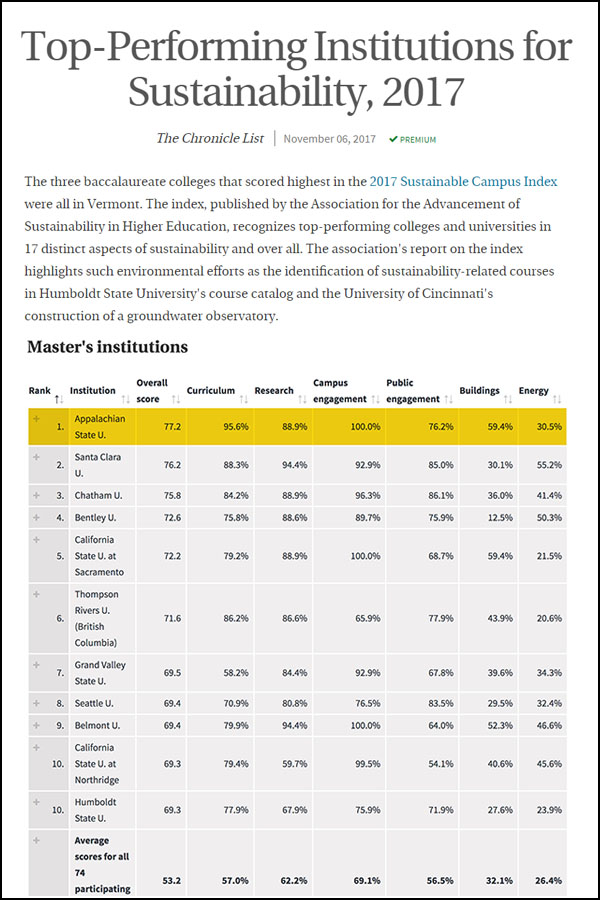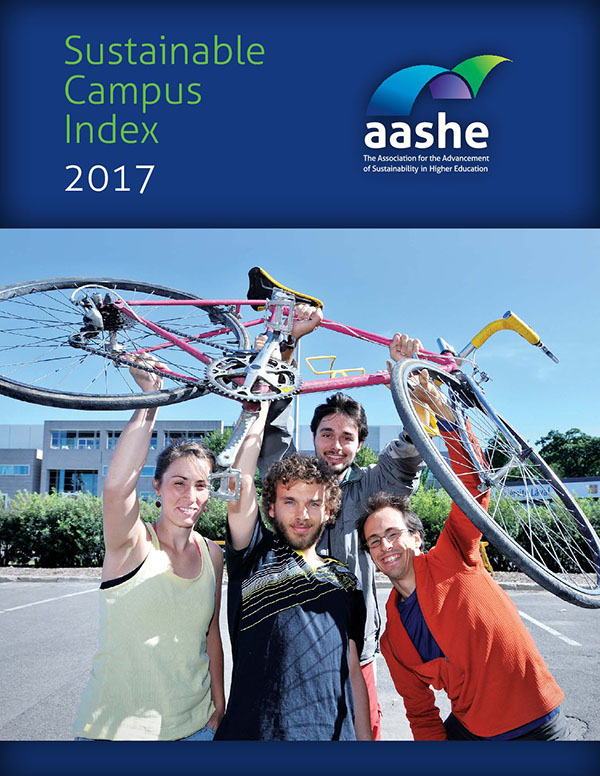BOONE, N.C.—In the 2017 Sustainable Campus Index compiled by the standard bearer for tracking sustainability in higher education, Appalachian State University ranked first among institutions with master’s programs and second overall in curriculum. The university tied for third for buildings, which is based on efficiencies in operations and maintenance, design and construction and indoor air quality.
The Association for Advancement of Sustainability in Higher Education (AASHE) highlights top-performing colleges and universities in 17 impact areas and overall by institution type, as measured by the Sustainability Tracking, Assessment & Rating System (STARS).
Appalachian retained its STARS Gold status, a designation shared by 104 other institutions out of the 868 schools participating in the program. STARS master’s institutions include colleges and universities that award at least 50 master’s degrees and fewer than 20 doctoral degrees annually.
Chancellor Sheri Everts said she is “extremely proud of our consistent high rankings with STARS. A deep and broad understanding of the interconnectedness of sustainability is always at the forefront as we identify priorities and set goals. We have institutionalized the concept of sustainability, and I trust we will continue as leaders within the higher education community.”
“We are very excited to be recognized for the second year in a row in the Sustainable Campus Index,” said Director of University Sustainability Dr. Lee Ball. “It has taken years of dedication and commitment by the entire Appalachian State community. Still, we have a lot of work to do to advance campus sustainability. We owe it to future Mountaineers to ramp up our efforts on buildings, renewables and energy.”
As the initiator and host of the Appalachian Energy Summit, held annually since 2012, Appalachian has assumed a leadership role in reducing the UNC system’s energy costs. Since 2012, its inaugural year, the summit has provided a platform through which UNC campuses together with industry partners have avoided more than $499 million dollars in utility costs, representing almost 9 billion pounds of CO2 emissions.
Ball said he hoped to include leadership from across the country in this year’s summit to see what energy and renewables initiatives are proving successful on other campuses.
In August, Everts announced she was prioritizing the university’s Zero Waste initiative and setting a goal to divert 90 percent of campus waste from the landfill by the year 2022. She challenged Ball and Vice Chancellor for Business Affairs Paul Forte “to find ways we can reduce waste and save money through our purchasing efforts.” She recognized the university’s Food Services for implementing purchasing practices that make it easier to divert waste.
In a recent survey, more than half of incoming students reported sustainability initiatives influenced their decision to attend Appalachian. The university is a first-place winner of Second Nature and the U.S. Building Council’s Center for Green Schools national Climate Leadership Award and ranked second overall (first in North Carolina) in the highest percentage of sustainability courses by the Sustainability, Tracking, Assessment & Rating System.
The Association for the Advancement of Sustainability in Higher Education (AASHE)
Inspiring higher education to lead the sustainability transformation
About Sustainability and Energy Management at App State
Appalachian State University’s leadership in sustainability is known nationally. The university’s holistic, three-branched approach considers sustainability economically, environmentally and equitably in relationship to the planet’s co-inhabitants. The university is an active steward of the state’s interconnected financial, cultural and natural resources and challenges students and others think critically and creatively about sustainability and what it means from the smallest individual action to the most broad-based applications. The university offers both undergraduate and graduate academic degree programs that focus on sustainability. In addition, 100 percent of Appalachian’s academic departments offer at least one sustainability course or course that includes sustainability, and all students graduate from programs that have adopted at least one sustainability learning outcome. Learn more at https://appstate.edu/sustainability.
About Appalachian State University
As a premier public institution, Appalachian State University prepares students to lead purposeful lives. App State is one of 17 campuses in the University of North Carolina System, with a national reputation for innovative teaching and opening access to a high-quality, cost-effective education. The university enrolls more than 21,000 students, has a low student-to-faculty ratio and offers more than 150 undergraduate and 80 graduate majors at its Boone and Hickory campuses and through App State Online. Learn more at https://www.appstate.edu.
What do you think?
Share your feedback on this story.








![How NCInnovation Is Rethinking Economic Development in North Carolina [faculty featured]](/_images/_posts/2026/02/rethinking-economic-development-600x400.jpg)







